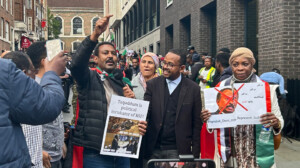New Darfur Govs roll out plans for ‘improvement’
In East Darfur, Resistance Committees’ advice is being adhered to; the Central Darfur and West Darfur governors are planning peace conferences; meanwhile South Darfur governor has pledged to issue an emergency order against bladed weapons and drugs.
 People flee Kass following recent attacks which displaced over 3,000 villagers in South Darfur (UNAMID)
People flee Kass following recent attacks which displaced over 3,000 villagers in South Darfur (UNAMID)
In East Darfur, Resistance Committees’ advice is being adhered to; the Central Darfur and West Darfur governors are planning peace conferences; meanwhile South Darfur governor has pledged to issue an emergency order against bladed weapons and drugs.
On Monday, the government of East Darfur announced it will form five joint teams to improve conditions in the region, in accordance with recommendations of Resistance Committees active in the state.
Governor of East Darfur, Mohamed Eisa, said that an economic team will be formed, along with a market team, vehicle counting team, hospital team, and internal (for university students) team in a press conference.
He attributed the slow issuance of decisions to the troubled relationship between him and the Forces for Freedom and Change (FFC) in the state. He indicated that this has begun to improve after an FFC delegation came from Khartoum to repair the relationship between the two parties.
Peace conferences
In Central Darfur, Governor Adeeb Abdelrahman met with a delegation from the DBA yesterday to discuss peace conferences in Zalingei. He affirmed his determination to uphold Rule of Law, human rights, and justice and equality.
In a press statement on Saturday, the DBA announced that the conferences will be held under the slogan “Establishing a culture of peaceful civil dialogue as an alternative to violence”.
The Darfur lawyers will organise the “national and local building conferences” in cooperation with “civil society forces and local political organizations” in the region and “the federal revolution government … to establish the base reference in discussing all issues of rights and freedoms in the country and to produce basic solutions for all national and local problems and crises, chiefly issues of war, peace, development and social stability”.
Among the invitees will be the international partners, interested parties and envoys for peace issues in Sudan, and international organisations, chiefly the United Nations, the European Union, the African Union, and the UN-AU Mission in Darfur (Unamid).
The newly appointed civilian governor of West Darfur is Mohamed El Doma, head of the DBA. After his arrival in El Geneina, he announced that a peace and nation-building conference will be held soon in the capital.
He also said that the priorities of his government's work are achieving security and stability in the state, stressing the importance of dealing with armed people decisively and using force to arrest them. He called on the youth to open their minds, and to distance themselves from tribalism and narrow affiliations.
El Doma visited the families of protestors killed in El Geneina.
Emergency order
In Nyala, the Governor of South Darfur, Mousa Mahdi, directed the security forces (Police forces, the Rapid Support Forces and the General Intelligence Service) to clamp down on armed robbery and thefts in Nyala. The governor pledged to issue an emergency order soon prohibiting the carrying of bladed weapons and drugs. In addition, he pledged to develop an integrated plan to fight drug traffickers.
The governor said that the dissolved National Congress and its members wreaked havoc on the land and created hotbeds of tribal conflicts. He said he believes the police are able to extinguish them. He also stated that he is a servant of his citizens rather than an authoritarian ruler, pledging to fight against partisanship, tribalism, and regionalism.
People from South Darfur living in Khartoum organised a vigil in front of the offices of the Council of Ministers on Sunday, protesting against last week’s violence in the Kass area. In Nyala, capital of South Darfur, hundreds of Fallata launched a sit-in on the same day, to protest against arrests of their fellow tribesmen carried out by the paramilitary Rapid Support Forces (RSF) over the past 10 days. At least 35 residents of villages in the area of Saadoun have been held without any legal justification, Adam El Nimeir told Radio Dabanga.











 and then
and then